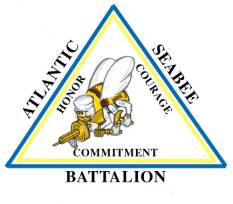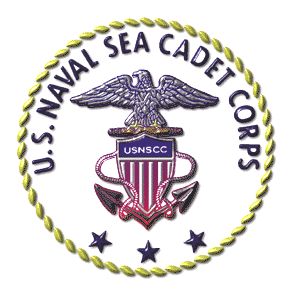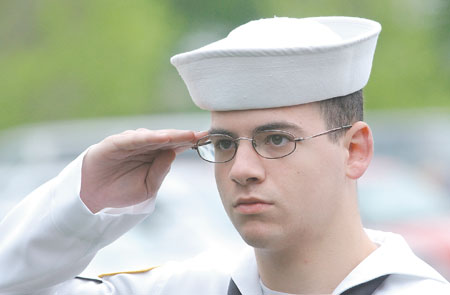
|
ATLANTIC SEA BEE BATTALION |

|
|
US NAVAL SEA CADET CORPS, PORTSMOUTH NAVAL SHIPYARD Resources |
Memorial Day Celebration, History, and Meaning
Memorial Day
Memorial Day is much more than a three-day weekend that marks the beginning of summer. To many people, especially the nation's thousands of combat veterans, this day, which has a history stretching back all the way to the Civil War, is an important reminder of those who died in the service of their country.Memorial Day was originally known as Decoration Day because it was a time set aside to honor the nation's Civil War dead by decorating their graves. It was first widely observed on May 30,1868, to commemorate the sacrifices of Civil War soldiers, by proclamation of General John A. Logan of the Grand Army of the Republic, an organization of former sailors and soldiers. On May 5, 1868, Logan declared in General Order No. 11 that: An 1880 Memorial Day parade on Riverside Drive in New York City.
The 30th of May, 1868, is designated for the purpose of strewing with flowers, or otherwise decorating the graves of comrades who died in defense of their country during the late rebellion, and whose bodies now lie in almost every city, village, and hamlet churchyard in the land. In this observance no form of ceremony is prescribed, but posts and comrades will in their own way arrange such fitting services and testimonials of respect as circumstances may permit. During the first celebration of Decoration Day, General James Garfield made a speech at Arlington National Cemetery, after which 5,000 participants helped to decorate the graves of the more than 20,000 Union and Confederate soldiers buried in the cemetery.
This 1868 celebration was inspired by local observances of the day in several towns throughout America that had taken place in the three years since the Civil War. In fact, several Northern and Southern cities claim to be the birthplace of Memorial Day, including Columbus, Mississippi; Macon, Georgia; Richmond, Virginia; Boalsburg, Pennsylvania; and Carbondale, Illinois.
In 1966, the federal government, under the direction of President Lyndon Johnson, declared Waterloo, New York, the official birthplace of Memorial Day. They chose Waterloo-which had first celebrated the day on May 5, 1866-because the town had made Memorial Day an annual, community-wide event during which businesses closed and residents decorated the graves of soldiers with flowers and flags.
By the late 1800s, many communities across the country had begun to celebrate Memorial Day and, after World War I, observances also began to honor those who had died in all of America's wars. In 1971, Congress declared Memorial Day a national holiday to be celebrated the last Monday in May. (Veterans Day, a day set aside to honor all veterans, living and dead, is celebrated each year on November 11.) A Memorial Day at the Tomb of the Unknown Soldier.
Today, Memorial Day is celebrated at Arlington National Cemetery with a ceremony in which a small American flag is placed on each grave. Also, it is customary for the president or vice-president to give a speech honoring the contributions of the dead and lay a wreath at the Tomb of the Unknown Soldier. About 5,000 people attend the ceremony annually.
Several Southern states continue to set aside a special day for honoring the Confederate dead, which is usually called Confederate Memorial Day.
Mike Sargent, of the Portsmouth Council Naval Sea Cadets, salutes during the national anthem at Albacore Park in Portsmouth Monday morning May 27th, 2003.
Staff photo by Carrie Niland'Valor and sarcrifice'
The Portsmouth Herald
By Sara Newbury
snewbury@seacoastonline.comPORTSMOUTH - Crisp, white naval uniforms stood out against the grayness of the day as the Portsmouth community honored 4,000 lost submariners at Albacore Park on Monday.
Every Memorial Day for 17 years, veterans and active military personnel have joined civilians at the park to hear the bell toll for each United States submarine lost at sea.
"The tolling of the lost boats is a time-honored tradition by submarine veterans, as they remember shipmates and fellow submariners still on patrol," said Gary Hildreth, command master chief at Portsmouth Naval Shipyard, as he welcomed those attending.
"Eternal patrol" was a phrase used throughout the ceremony to acknowledge the men killed aboard 72 different submarines since 1900.
"Today, we carry in our hearts the memory of those who went before us and gave of themselves selflessly - particularly our shipmates, who remain on eternal patrol," said Michael Gilmore, deputy commander of Portsmouth Naval Shipyard and Mondayís keynote speaker.
Gilmore also honored the men and women who are currently serving in the armed forces.
"One of the reasons this is such an important event is because we are engaged in a world war against terrorism," he said. "Ladies and gentlemen, thatís what the submarine force is all about. Itís about delivering combat capability that enables us to take the sovereignty of our great United States of America to the far corners of the earth."
Gilmore said the United States has the greatest submarine force in the world, calling it the cornerstone of the Navy. He added that the ballistic missile submarine was a key element in winning the Cold War. And though he continued to honor the past, Gilmoreís speech kept returning to the present day.
"We live in a time when service is so important," he said. "I see a nation mobilized, answering the call to service. The war we are fighting to eliminate terrorism is a war certainly worth fighting."
Members of the Portsmouth High School Band played patriotic tunes as rows of military personnel stood silently beside them. Dozens of community members sat beneath a tent, sheltered from a light rain.
Mayor Evelyn Sirrell went to the podium to speak on behalf of the city.
"The waters are silent," she said. "But our love stands firm for all of our veterans who are buried at sea, and those veterans who are still alive. We will not forget what you did for your country and the sacrifices that you made to create peace for this generation."
Wreaths were placed on four memorials at the park, including the USS Squalus Memorial, the USS 0-9 Memorial and the Thresher Memorial. The final wreath was placed on the World War II Submarines Lost Memorial.
"Today we pay tribute, honoring the naval personnel and civilians who paid the ultimate sacrifice while serving on board United States submarines in both peace and war," Hildreth said in his introduction. "We remember them all, particularly those lost in submarines close to the heart of our Seacoast community."
Rain began to fall harder as the shipyard honor guard fired its rifles in a salute, and a lone trumpeter played taps.
